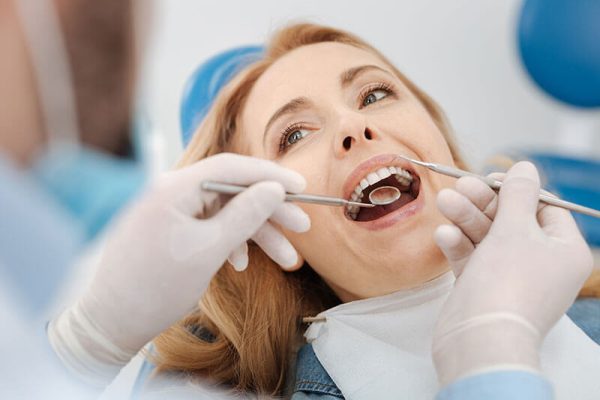Achieve Dental Implant Success!
Do you have a dental implant treatment coming up? Learn how to properly prepare for your surgery and how to care for your dental health immediately after your surgery. Our Wasilla dental team wants to make sure you can achieve great success with dental implants!

Prepare for Dental Implant Placement
Dental implants can be a life-changing treatment for patients who have lost one or more teeth. It can help restore your smile, improve your ability to chew and speak and prevent further bone loss in your jaw. However, properly preparing for your dental implant procedure will help ensure a smooth and successful outcome.
The Day Before Your Dental Implant Appointment
One day before your appointment, you should:
- Arrange for transportation to and from the surgery center. You won’t be able to drive yourself home after the procedure.
- Avoid eating or drinking anything after midnight the night before your surgery. This includes water, as it can cause nausea during the procedure.
- Take any medications prescribed for your procedure as directed.
The Morning of Your Dental Implant Appointment
On the morning of your implant procedure, you should:
- Follow your dentist or oral surgeon’s instructions regarding fasting. You’ll likely be instructed not to eat or drink anything for several hours before the procedure.
- Wear comfortable, loose-fitting clothing. Avoid clothing with tight collars or buttons that can cause discomfort during the procedure.
- Brush your teeth as usual, but avoid using mouthwash or toothpaste with a strong flavor.
- Take any pre-operative medications as directed by your dentist or surgeon.
- Bring a list of allergies, medications, or medical conditions that may be relevant to the procedure.
Make Plans for Post-Operation
Making plans ahead of time to prepare for your dental implant recovery process will help ensure success after the surgical procedure. To be prepared after your procedure, consider doing the following beforehand:
- Lightening or clearing your schedule for one week
- Have someone ready to drive you to and from the dentist’s office as sedation dentistry is typically involved
- Taking at least two days off of work
- No plans for exercise for at least one week
- Buying soft and cold foods
- Buying over-the-counter pain medications

How to Care for Your Dental Implants After Surgery
Proper care is essential during the postoperative period to ensure the success of your dental implant procedure. Make sure you’re following the instructions given to you by your dentist to avoid complications or infection.
Immediate Post-Op Instructions for Dental Implants
After the implant procedure, your dentist will provide specific instructions on how to practice good oral hygiene. These instructions may include:
- Avoid smoking and using straws for the first 24 to 48 hours
- Apply an ice pack to the affected area for the first 24 hours to reduce swelling
- Avoid crunchy, spicy, or hard foods for the first few days
- Take any prescribed pain medication as directed
- Use an antimicrobial mouthwash as directed
- Keep the surgical area clean by gently rinsing it with salt water
- Schedule a follow-up appointment to visit your dentist in the next few days
Bleeding
Bleeding is a common side effect of the dental implant procedure, and most patients with implants will experience minor bleeding for the first 24 hours afterward. You can manage bleeding by biting down on a gauze pad provided by your dentist for about 20 to 30 minutes. This will help form a blood clot at the implant area and stop the bleeding.
If bleeding persists or becomes heavy, contact your dentist immediately, as this could be a sign of a complication. Your dentist may recommend additional measures, such as reapplying gauze or taking medication to help stop the bleeding.
Swelling
Swelling is a common side effect of the surgery and can be managed by applying ice packs to the affected area for the first 24 hours. Avoiding hard or crunchy foods, like potato chips and hard candy, for the first few days can also help reduce swelling.
Managing Pain
Your dentist may prescribe pain medication to help manage any discomfort you experience after the procedure. Be sure to take the medication as directed and contact your dentist if your pain becomes unbearable or persistent.
Diet
Stick to a soft foods diet for the first few days following the procedure to avoid putting unnecessary pressure on the surgical site. Avoid chewing around the implant as it can irritate. As you heal, you can gradually return to your normal diet. Maintaining a proper diet as your dental implants are healing is essential for a successful treatment and great for your overall health.
Avoid smoking and alcohol consumption after the procedure as it can interfere with the healing period and cause complications. Also, make sure you stay hydrated with plenty of water and avoid drinking through a straw.
Oral Hygiene Care
Oral hygiene is a crucial component of post-op care for dental implants. Keep the implant site and surrounding teeth clean to prevent infection and promote healing. Immediately following the procedure, avoid brushing or flossing the implant site for the first 24 hours. After that, you should brush your teeth, and the implant site gently. You can use a soft-bristle toothbrush and gentle circular motions to clean the implant site. Make sure you also floss daily.
Your dentist may also recommend including an antimicrobial mouthwash in your dental hygiene routine to help reduce the risk of infection and promote healing. Follow your dentist’s instructions regarding mouthwash, as overuse or misuse can be harmful to oral health.
Physical Activity
Avoid strenuous physical activity for the first few days following the procedure to allow the implant area to heal properly. Gradually return to your normal activity level as directed by your dentist. Overexertion may lead to post-op bleeding or discomfort, so do your best to take it easy for the first few days of your recovery.

Frequently Asked Questions
It’s best to avoid wearing makeup or jewelry to your implant surgery appointment as it can get in the way of the procedure and increase the risk of infection. We also recommend wearing comfortable clothing.
The length of your implant procedure will vary based on how many implants you need and where they’re being placed in the jawbone. Your dentist or oral surgeon will provide you with an estimated time for the procedure at your initial consultation.
Several symptoms may indicate a dental implant infection. Some common signs to look out for include:
- Pain or discomfort around the implant
- Swelling or redness in the area
- Warmth or tenderness to the touch
- Dealing with drainage or pus
- A foul taste or odor coming from the implant
- A fever or feeling unwell
- Difficulty biting or chewing
- Loss of implant stability or mobility
If you experience any of these symptoms mentioned above, contact your dentist immediately. They’ll diagnose the problem and recommend an appropriate treatment. Remember to maintain good oral hygiene and follow your dentist’s instructions for dental implant post-op care to prevent infection.
Exercise is generally discouraged for the first few days after the surgery as it can cause increased blood flow to the area, slowing down healing. It’s best to avoid strenuous exercise or physical exertion for at least the first week after surgery and consult with your dentist before resuming any exercise regimen.
Dental Implants Can Help You Smile Confidently
Make sure you’re ready for your dental implant surgery! To learn more about dental implants, schedule a consultation with our Wasilla dentist today!
